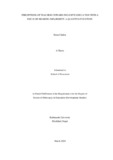
Please use this identifier to cite or link to this item:
https://hdl.handle.net/20.500.14301/396| Title: | Perceptions of Teachers toward Inclusive Education with a Focus on Hearing Impairment: A Quantitative Study |
| Authors: | Chalise, Kiran |
| Citation: | Chalise.K.(2024). Perceptions of teachers toward inclusive education with a focus on hearing impairment: A quantitative study.. |
| Issue Date: | Mar-2024 |
| Publisher: | Kathmandu University School of Education |
| School: | SOED |
| Department: | DODE |
| Level: | Ph.D. |
| Program: | PhD in Development Education |
| Abstract: | Inclusive education ensures that all children can obtain a quality education in a child friendly, bias-free environment and fairly address their various needs. With this assumption, this study was carried out to determine teachers' perceptions of children with hearing impairments (CWHI) and their education. The study was based on the perceptions of teachers teaching CWHI at special schools, resource classes, and integrated schools in Nepal. Since Nepal has both integration and segregation models of inclusive education, the study captured the perceptions of teachers teaching special schools in terms of self-efficacy, knowledge, attitude, and thematic areas of inclusive education. The quantitative method was applied to describe teachers' perceptions of inclusive education practices and teachers’ self-efficacy, knowledge, and attitude. The study explored the relationship between teachers’ self-efficacy and inclusive education practices and the contribution of teachers’ self-efficacy to the different factors/themes of inclusive education practices through correlation and binary logistic regression analysis. Data for the study were collected through an individual survey with Nepalese school teachers and head teachers where children with hearing impairments were enrolled. The questionnaire, in statement format on a five-scale response, was designed by 182 respondents (87 males, 95 females) from the schools of seven provincial 20 districts of Nepal in the study. The Likert scale-based analysis, in terms of mean, weighted mean, and standard deviation, was used for descriptive analysis to identify the level of perceptions of teachers toward inclusive education practices. The relationship between teachers' self-efficacy and inclusive education practices was investigated using correlation analysis, ensuring responses from resource classes and integrated schools. Similarly, the contribution of teachers' self efficacy to the various factors/themes of inclusive education practices was predicted using binary logistic regression analysis. The result shows that teachers' perceptions toward inclusive education appears to be high (in most cases) when considering their self-efficacy, knowledge, and attitude, along with inclusive education in the schools. Teachers' self-efficacy seems more consistent with the special schools than the other categories of schools, but the self-efficacy appears to be high in resource classes. The study indicates some problematic areas also. The relationship between teachers' self-efficacy and inclusive education practices is positive and significant, but it is not strong enough. A relatively moderate and positive correlation was found between the teachers' self-efficacy and ‘important knowledge’ and ‘learning environment’ in the schools. This result suggests that teachers who have good self-efficacy can contribute effectively to enriching the inclusive education practices in the schools. The study projected that teachers’ self-efficacy contributed the most to the themes of ‘availability of rights,’ ‘roles and responsibilities of educational authorities,’ and ‘learning environment’ of inclusive education practices. It is established that teachers' self-efficacy is the main predictor of ensuring the availability of rights, roles, and responsibilities and a learning environment in schools. The study indicated that if there are programs and approaches for enhancing teachers’ self-efficacy along with their knowledge and attitude, they can effectively contribute to improving the quality of CWHI-focused inclusive education in schools. |
| URI: | https://hdl.handle.net/20.500.14301/396 |
| Appears in Collections: | Theses |
Files in This Item:
| File | Description | Size | Format | |
|---|---|---|---|---|
| WCC_Kiran Chalise 123.pdf | 2.02 MB | Adobe PDF |  View/Open |
Items in DSpace are protected by copyright, with all rights reserved, unless otherwise indicated.